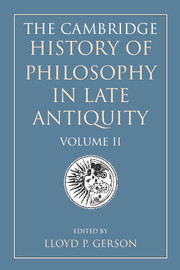Book contents
- Frontmatter
- VI Late Platonism
- VII The third encounter of Christianity with ancient Greek philosophy
- VIII Philosophy in transition
- Introduction to Part VIII
- 46 Early Byzantine philosophy
- 47 The origins of Islamic philosophy
- 48 Ancient philosophy becomes medieval philosophy
- Appendix: List of works of ancient authors
- List of abbreviations
- Bibliography
- Index locorum
- General index
- References
47 - The origins of Islamic philosophy
from VIII - Philosophy in transition
Published online by Cambridge University Press: 28 May 2011
- Frontmatter
- VI Late Platonism
- VII The third encounter of Christianity with ancient Greek philosophy
- VIII Philosophy in transition
- Introduction to Part VIII
- 46 Early Byzantine philosophy
- 47 The origins of Islamic philosophy
- 48 Ancient philosophy becomes medieval philosophy
- Appendix: List of works of ancient authors
- List of abbreviations
- Bibliography
- Index locorum
- General index
- References
Summary
THE TRANSMISSION OF THE GREEK LEGACY TO THE ARAB WORLD: AN OUTLINE
It is widely acknowledged that the origins of Arabic-Islamic philosophy are to be found in the transmission of a great amount of texts both from classical Greece – some Plato and virtually the whole of the Aristotelian corpus – and post-classical Greek thought, from Hellenism to late antiquity. In this chapter, we shall see that post-classical thought has been of momentous importance in the Arab interpretation of Plato’s and Aristotle’s doctrines. Predictably, the transmission of their works was made possible through the spread of classical Greek philosophy in the Mediterranean area during the Hellenistic and imperial ages, and then again through the scholastic tradition of late antiquity. However, post-classical thought was decisive for the rise of Islamic philosophy even from a more substantial point of view: the main problems dealt with by Muslim philosophers can be understood only against the background of the rethinking of Plato and Aristotle which took place in the imperial age, chiefly thanks to Alexander of Aphrodisias and Plotinus. Furthermore, the systematic structure into which Aristotle’s doctrines were moulded in the curricular teaching in the schools of late antiquity paved the way for their transmission to Latin and Arabic thought.
- Type
- Chapter
- Information
- The Cambridge History of Philosophy in Late Antiquity , pp. 869 - 893Publisher: Cambridge University PressPrint publication year: 2000
References
- 2
- Cited by



